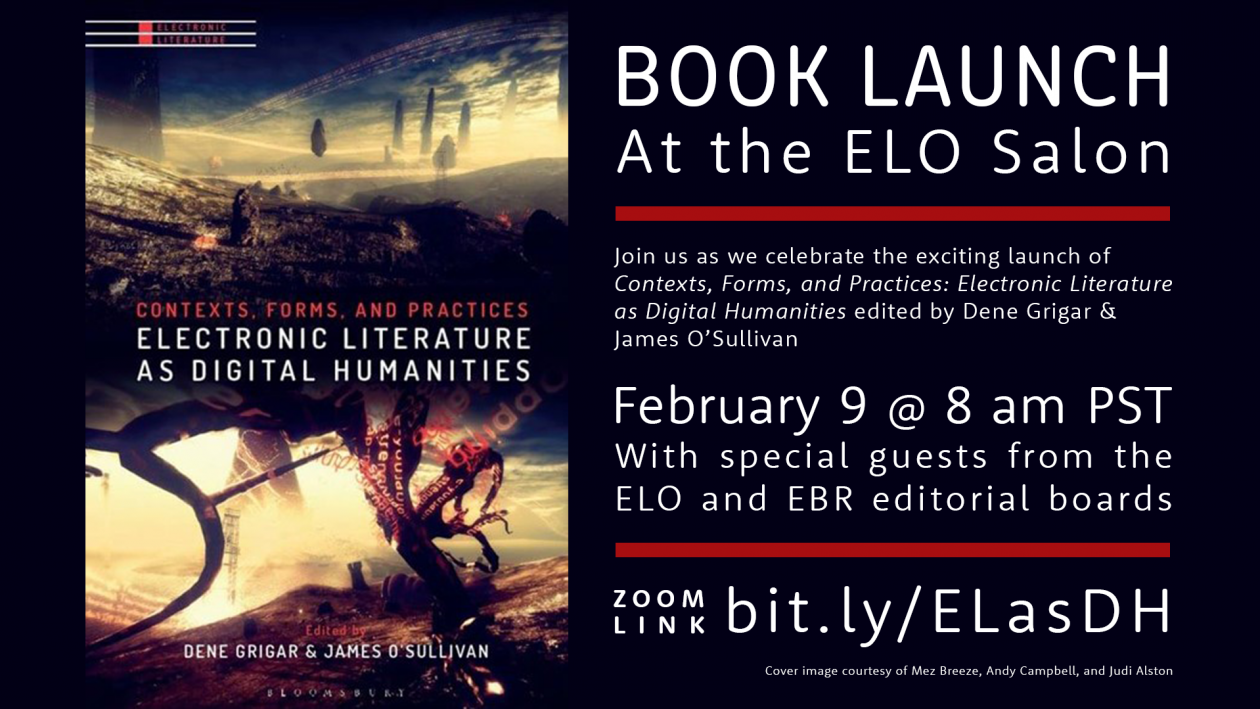Events
-
ELO 2026: Online Conference Announced
ELO 2026 will be held online, with the Call for Proposals arriving in late November 2025. See the preliminary site for details. Read more.
-
CFP: ELO 2023 Coimbra (Extended Jan 31; July 12-15, 2023)
ELECTRONIC LITERATURE ORGANIZATION 2023 INTERNATIONAL CONFERENCE AND MEDIA ARTS SHOW OVERCOMING DIVIDES: ELECTRONIC LITERATURE AND SOCIAL CHANGE JULY 12-15, 2023 – COIMBRA, PORTUGAL Deadline January 31 (CFP: updated January 20,… Read more.
·
-
CFP: ELO 2022 Special Call: Mentoring Exhibition (March 15)
“Show me how to do this” Learning E-lit by Making Together CFP: ELO 2022 Special Call: Mentoring Exhibition Deadline March 15, 2022 Extended to April 1, 2022 Online Exhibition: June… Read more.
-
E-lit as DH Book Launch Feb 9
Book Launch at Electronic Literature Organization Salon Electronic Literature as Digital Humanities: Contexts, Forms, and Practices by Dene Grigar and James O’Sullivan Join us as we celebrate the exciting launch… Read more.
-
Tribute to the Flash Generation Dec. 31
A Toast to the Flash Generation Thursday, December 31, 2020 10 a.m.-5 p.m. PST Zoom: http://bit.ly/ToastToFlash Hosted by Dene Grigar, Director, Electronic Literature Lab; Digital Preservationist, Electronic Literature Organization Join… Read more.
-
Call for Nominations for ELC 4 Editors
ELO has put out the call for self-nominations for editors for the fourth Electronic Literature Collection. See the full call below and consider answering it, so you can help shape… Read more.
-
ELO Cork begins
The 2019 ELO conference has begun! The conference, hosted at University College Cork, runs July 15-17. This is the first international conference of digital literature held in Ireland and marks… Read more.
·
-
CFP: ELO @ MLA19 (Jan 4)
Natural Language: Readings and Performances January 4, 2019 School of the Art Institute of Chicago 37 S. Wabash, Room 327, Chicago, IL Reception at 6:30, Readings at 7:30 http://dtc-wsuv.org/wp/elit-saic/2018/12/29/join-us/ In… Read more.
-
CFP: ELO 2019 Conference & Media Arts Festival (7/14-16/19; 12/21/18)
ELO 2019 Conference and Media Arts Festival Peripheries Cork, Ireland July 14-16, 2019 (Due: Dec 21, 2018) Proposals are now being accepted for presentations and exhibition pieces at the annual Electronic Literature… Read more.
·
-
Arabic E-Lit Conference in Dubai (Feb 25-27) Commences
The first (to our knowledge) electronic literature conference in Dubai has commenced. Hosted at RIT in Dubai, the conference was organized by Babak Elahi, Reham Hosny, and Patrick Lichty, Jonathon… Read more.

